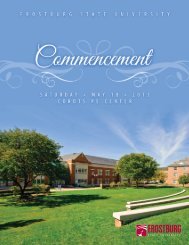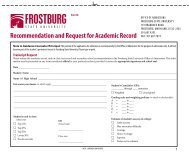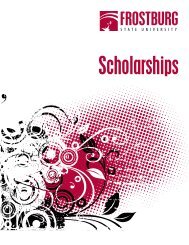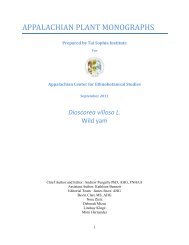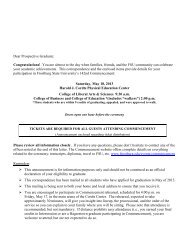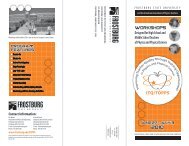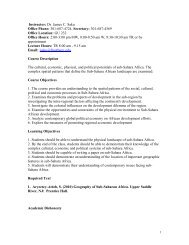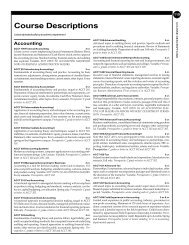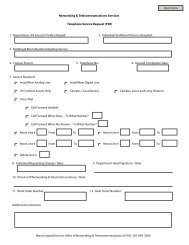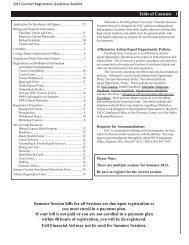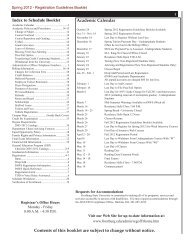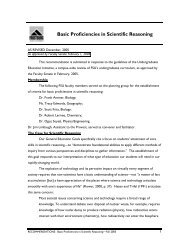Fall 2009 - Frostburg State University
Fall 2009 - Frostburg State University
Fall 2009 - Frostburg State University
Create successful ePaper yourself
Turn your PDF publications into a flip-book with our unique Google optimized e-Paper software.
newsbriefs<br />
The <strong>University</strong> Advancement staff now headquartered<br />
at the Lyric Building on Main Street are, from left,<br />
Bernard J. Davisson, II ’81, Todd Moffett, Janelle Moffett,<br />
Leslie Reed, Laura Bowling ’05, Barbara Filer, Robert<br />
Spahr, Becky Carrington, Carlie Zoubek, Cherie Krug, Ann<br />
Buskirk ’99/M’01, Alicia White ’85 and Carolyn Brown.<br />
Missing from the photo are Shannon Gribble ’98 and<br />
Lynn Ketterman.<br />
Lyric Building, FSU Main St.<br />
Presence Taking Shape<br />
FSU is gaining more of a “face” on Main Street<br />
in <strong>Frostburg</strong>. Thanks to a $250,000 grant from<br />
the Maryland Department of Housing and<br />
Community Development to the FSU Foundation<br />
and administered by FSU, most of the first floor of<br />
the historic Lyric Building, 16-24 E. Main St., has<br />
been adapted to FSU’s use.<br />
In September, the FSU Bookstore opened the<br />
Bobcat Store, selling <strong>Frostburg</strong>-branded shirts,<br />
hats, cups and other items. Then, in November,<br />
<strong>University</strong> Advancement moved its offices there,<br />
including the FSU Foundation and the Office<br />
of Alumni Programs. (Communications and<br />
Media Relations, which is also under <strong>University</strong><br />
Advancement, has remained in Hitchins.) Now<br />
the space occupied by the former theatre is available<br />
for rent as a community entertainment and<br />
gathering venue.<br />
The building’s developer, Michael Joy, has<br />
renovated the space in the building that was<br />
nearly gutted by fire in 2004 and faced demolition<br />
without intervention by Joy, FSU and the City<br />
of <strong>Frostburg</strong>. Joy has also developed 11 apartments<br />
on the second and third floors.<br />
— LDM<br />
FSU Renews Its Commitment to Sustainability With Earth Week <strong>2009</strong><br />
This year, FSU responded to the growing need to increase awareness of climate change and sustainability<br />
by celebrating not just a single Earth Day, but a whole week’s worth of activities dedicated to<br />
environmental education and dialogue.<br />
Organized by the <strong>University</strong>’s Learning Green, Living Green (LGLG) Committee, Earth Week<br />
<strong>2009</strong>, which ran April 20 through 24, devoted each day of the week to a different aspect of<br />
environmental awareness: “A Day of Celebration,” “A Day of Learning,” “A Day of Action,” “A<br />
Day of Appreciation” and “A Day of Service.” Highlights included a lecture by keynote speaker<br />
Brian Tokar, a noted advocate, author and prominent voice on environmental issues since the<br />
1970s; Focus <strong>Frostburg</strong>, a “Day of Learning” featuring presentations by FSU faculty, staff and<br />
community partners; a concert with earth-themed vocal and instrumental pieces by FSU’s musical<br />
talent; and a “Reduce, Recycle, Reuse” poster contest, which invited people to vote for their<br />
favorite student-created Earth-themed posters in person and online at FSU’s Earth Week <strong>2009</strong><br />
Facebook group. Taking a holistic approach to sustainability, FSU also incorporated its annual<br />
Relay for Life fundraiser as part of Earth Week’s “Day of Service.” The event drew 818 participants<br />
divided among 59 teams and raised nearly $44,000 for the American Cancer Society.<br />
Following Earth Week <strong>2009</strong>, FSU’s LGLG team completed<br />
a working draft of the campus’ Climate Action Plan<br />
and presented it to FSU’s Executive Committee May 6.<br />
The Climate Action Plan, a requirement of FSU’s membership<br />
in the American College and <strong>University</strong> President’s<br />
Climate Commitment (ACUPCC), outlines comprehensive,<br />
specific strategies that will guide the <strong>University</strong><br />
in reducing its carbon footprint. It will be submitted to<br />
ACUPCC in September.<br />
For more information on Learning Green, Living Green<br />
and Earth Week <strong>2009</strong>, visit www.frostburg.edu/lglg or<br />
look for “Earth Week <strong>2009</strong>, <strong>Frostburg</strong> <strong>State</strong> <strong>University</strong>”<br />
on Facebook.<br />
— BR<br />
Two Millennia of Service to FSU<br />
Nearly 90 <strong>Frostburg</strong> <strong>State</strong> retirees gathered in June for a luncheon in their honor in the Compton Atrium. Representing more than<br />
2,000 years of service to the institution, with some individuals starting at <strong>Frostburg</strong> as early as 1950, these retirees were given an<br />
update on FSU’s current situation and future plans.<br />
Godiva, a member of FSU’s tamarin colony<br />
“There are very few<br />
colleges and universities<br />
in the country that give<br />
undergraduates the chance<br />
to study the behavior of<br />
nonhuman primates, so<br />
this is an especially exciting<br />
opportunity for FSU.”<br />
New Facility Offers Research Opportunity<br />
in Animal Behaviors<br />
For the past year, FSU has been home to 12 cotton-top tamarins, who live in newly renovated space in<br />
the Guild Center. The tamarins, a very small monkey species found in the wild only in Colombia, were<br />
generously donated to FSU by the <strong>University</strong> of Wisconsin, Madison, in hopes of continuing the legacy of<br />
quality noninvasive behavioral research with this species that was begun by Dr. Charles T. Snowdon, his<br />
students and collaborators.<br />
FSU students have a rare opportunity<br />
to work with the tiny members of this<br />
unique species, who weigh between 1<br />
and 1.5 pounds and are called “cotton-top”<br />
because of the “Einstein-like”<br />
hair on their heads. FSU’s tamarins were born<br />
in captivity and are housed in male-female<br />
pairs in large aviary-like enclosures that have<br />
been arranged with a variety of branches to<br />
simulate their natural habitat. Environmental<br />
enrichment is very important in the care of<br />
these animals, and each tamarin pair has toys,<br />
swings and<br />
foraging<br />
opportunities<br />
to<br />
keep them<br />
active. The<br />
care and<br />
well-being<br />
of these<br />
very special<br />
animals are of the utmost importance, and the<br />
colony is fortunate to have an excellent team<br />
of students and volunteers dedicated to their<br />
daily care.<br />
We want you back....<br />
Check out employment opportunities on our Web site,<br />
www.frostburg.edu/hr/jobs.htm<br />
Dr. Erica Kennedy and Zagnut<br />
You already know how great <strong>Frostburg</strong> <strong>State</strong> <strong>University</strong> is.<br />
Why not come back and work here?<br />
Dr. Erica Hoy Kennedy of the Psychology<br />
Department directs the tamarin colony and<br />
noninvasive student research involving the<br />
behavior and problem-solving abilities of these<br />
animals. Kennedy has spent more than eight<br />
years studying the intelligence of a variety of<br />
primate species. She believes that the tamarin<br />
colony will serve as a valuable opportunity for<br />
FSU students and area K-12 students to learn<br />
about animal behavior research. There are very<br />
few colleges and universities in the country<br />
that give undergraduates the chance to study<br />
the behavior of nonhuman primates, so this<br />
is an especially exciting opportunity for FSU.<br />
The addition of the tamarin colony has also<br />
allowed for the development of related courses.<br />
Kennedy is now teaching a new course titled<br />
“Animal Learning and Cognition,” which<br />
involves students conducting behavioral<br />
observations of the tamarins as part of a course<br />
project.<br />
Another important goal of FSU’s tamarin<br />
colony is to increase students’ knowledge of<br />
conservation issues. Cotton-top tamarins are<br />
an endangered species, and sadly there are<br />
very few of them left in the wild, where their<br />
natural habitat is being lost to deforestation.<br />
One of Kennedy’s goals is to increase awareness<br />
of this species and of ways to help them<br />
in the wild. Conservation programs such as<br />
“Proyecto Titi” provide an avenue to assist<br />
cotton-top tamarins through education and<br />
financial contributions.<br />
— Dr. Erica Kennedy<br />
4 PROFILE FALL<strong>2009</strong><br />
5




